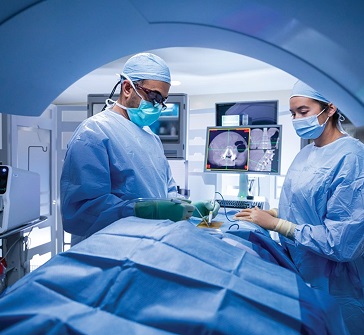 Book Appt.
Book Appt.
 Call Now
Call Now


Spine Surgery refers to any surgical intervention that is performed to address complex problems of the spine and associated structures. These can either be congenital or acquired later in life, due to an underlying disease, injury, accident or other trauma. Spine surgery can be performed using the conventional approach or via minimally invasive means. Surgical intervention is usually recommended for patients who have a debilitating spine condition that cannot be managed by medication alone.
Why choose SHALBY Sanar International Hospitals?
SHALBY Sanar International Hospitals is a centre for India's finest spine care technology, where you can find advanced solutions to the most complex spine diseases and disorders. The hospital has a dedicated spine unit, offering comprehensive evaluation and care to patients with a wide range of spine conditions. We have a dedicated team of spine specialists who bring years of expertise to the table, ensuring unparalleled quality care and treatment. At Sanar, we resort to the latest innovations and advancements that help us deliver precision-based results with added safety. Our expert team comprises of highly efficient and specialised spine surgeons, doctors, radiologists, anaesthesiologists, physiotherapists and dedicated nurses, all working in coordination to give you an experience that is at par with excellence.
AREAS OF EXPERTISE
A- Minimally invasive spine surgery, or MISS, is a highly advanced approach to performing various spinal interventions via tiny, keyhole incisions instead of making a large incision, as in the case of conventional or traditional open surgery. This is done with the help of precision-based imaging guidance offered by a surgical camera, which is introduced inside the patient’s body via one of the tiny openings. MISS offers a number of benefits over conventional surgery. These include:
A- Spine surgery may be recommended for patients suffering from any of the following:
A- If you have been recommended to go for spine surgery, there are a few things that you need to do to avoid unnecessary complications and make the experience hassle-free.
A-Patients undergoing spine surgery are likely to experience pain, soreness, and stiffness for some time, especially during sitting or standing. The time taken for recovery varies depending on the type of surgery, the approach followed, and the condition to be addressed. Generally, it takes 4 to 6 weeks to resume normal, low-intensity activities.
A-The success rate of spine surgery is quite high in India and ranges between 80 and 90 percent, depending upon the type of intervention.
A-Various advantages of spine surgery that make it the trusted choice of our experts at SHALBY Sanar International Hospitals include:
Lumber decompression is also known as a lumbar laminectomy. It is a surgical ...
It is a new-age technique that has revolutionized spinal care by making it po...
Spinal Deformity refers to a condition marked by the abnormal alignment of th...
Spinal Infections are rare but potentially life-threatening diseases caused b...
Spinal Cord Injury can be caused by a blunt physical impact that could be the...
These refer to all the cancerous/non-cancerous growths that develop on any pa...
Spinal Stenosis is a condition marked by the narrowing of the space within th...
Is also known as Kyphoplasty. It is a Minimally Invasive procedure that is re...
SHALBY Sanar International Hospitals provides extensive medical procedures backed up with our state-of-the-art technology and a team of highly qualified & experienced clinical experts.

Patient from Iraq gets treated by Dr. Harnarayan Singh | SHALBY Sanar International Hospitals

15 year old Patient from Liberia gets treated by Dr Harnarayan Singh | Neurosurgery & Spine Surgery

Mrs. Khalida Khaleel from Iraq Overcomes Degenerative Disc & Grade 1 Spondylolisthesis

Successful Treatment of a Patient from Uzbekistan for Degenerative Disc Disease and Back Syndrome

Surviving Stroke: Bipasha Banerjee's Testimony on Timely Intervention

Successful Intraoperation Neuro Monitoring on patient Hasan from Iraq

Successful removal of Glioma using advanced machines

A multidisciplinary care worked wonders for Ms. Akhtamova from Tajikistan

Treatment for Brain Aneurysm - Al Qumairi Saeed Mohsen Awadh from Yemen
Our doctors pen down their research findings and experiences from time to time. Their words provide deep insight into the latest techniques, technologies and other advancements in healthcare. It provides expert answers to all kinds of health questions for real-life issues.
VIEW ALL




Since the day of its foundation, SHALBY Sanar International Hospitals is committed to provide comprehensive healthcare services. It regularly organizes awareness programs in its premises and encourages outdoor healthcare activities and camps with an intent to put focus on preventive healthcare.
VIEW ALL